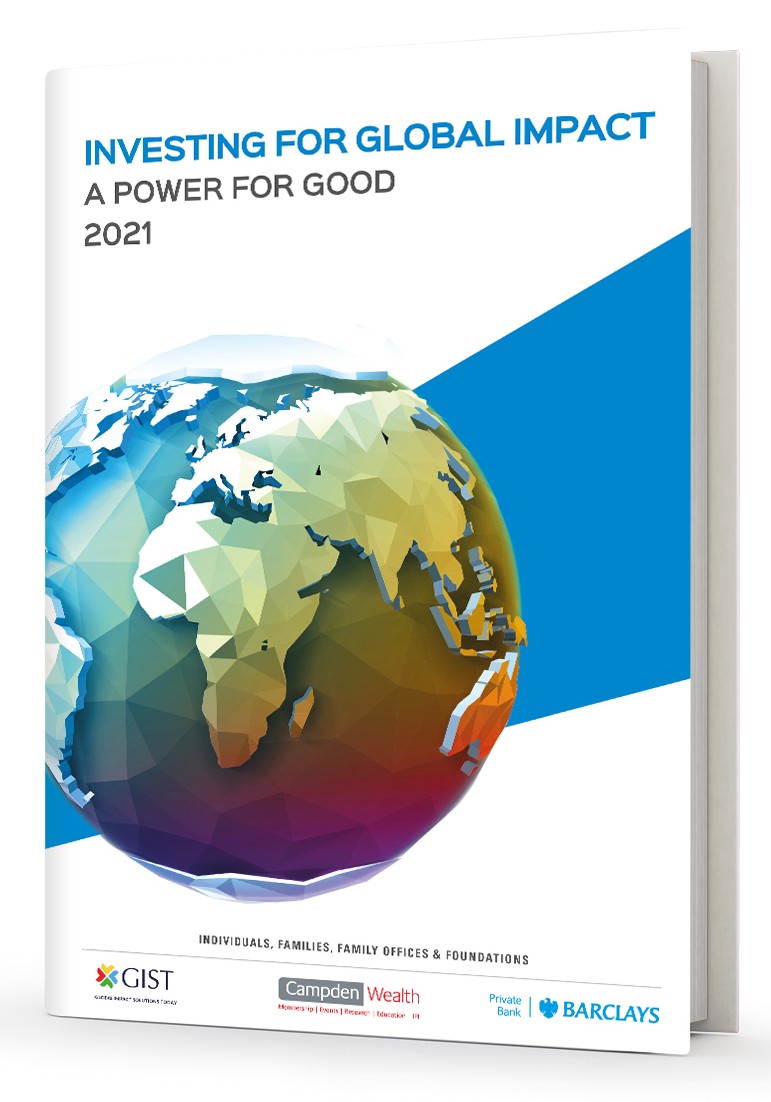Coordination and data vital for sustainable investment impact and returns

Adiraj Gupta, the next generation co-founder of startup incubator Impact Launchpad, says interest in sustainability has increased among investors in the wake of Covid-19, but calls for greater co-ordination and data gathering to deliver real positive change.
The digital native entrepreneur said the transparency of blockchain and accurately being able to map actions to outcomes will go a long way in making a difference in sustainable and impact investing.
Gupta is descended from two prominent families in India where his grandparents still run the family office and family businesses. Educated in New Zealand and based in New York, the next-gen supports his family with investment opportunities. An investor since the age of 12, he was successfully exiting his first startups by his late teens.
 As well as establishing Impact Launchpad in 2020, Gupta co-founded and is the director of Crypto Launchpad, started in Wellington in 2017, to provide investors audited and independent information on new initial coin offerings. He manages his portfolio of more than 70 companies with a collective valuation of more than $1.5 billion.
As well as establishing Impact Launchpad in 2020, Gupta co-founded and is the director of Crypto Launchpad, started in Wellington in 2017, to provide investors audited and independent information on new initial coin offerings. He manages his portfolio of more than 70 companies with a collective valuation of more than $1.5 billion.
CampdenFB put the findings of the new Investing for Global Impact: A Power for Good 2021 report by Campden Wealth to the entrepreneur for his insights.
A notable 70% of the families, foundations and individuals surveyed told Campden Research the transition to net zero has become “the greatest commercial opportunity of our age” as it represents a chance to benefit from the companies and innovations addressing climate change.
Almost one-third (30%) of global wealth holders are targeting investments that directly support a transition to a low carbon economy, and 24% are seeking to avoid any companies they assess as major contributors to the issue of climate breakdown.
 Money for new investment opportunity stock sustainable investing impact.jpg) What is your reaction to this change in attitude? Should such private sustainable investors take the lead in the global transition to a low carbon economy?
What is your reaction to this change in attitude? Should such private sustainable investors take the lead in the global transition to a low carbon economy?
I think this attitude is a step in the right direction, but the work is just getting started. As much as the movement by investors shifting to these areas is beneficial, there is a lack of coordination that will diminish the impact and the returns.
The analogy I’d use is if investors were investing individually everyone wants the “best investment”, which often means the whales and the sharks of the “oceans” are being the fish to receive an out proportional amount of funding and resources. When in reality it’s the plankton and the whole food chain that as a collective being given appropriate fuel to grow would have the biggest impact. Everyone is looking for the silver bullet, but the solution may be more simple than that if we mapped and coordinated the various activities and collective capital flowed it would make a larger impact as all the crevices that may be missed otherwise can be covered particularly when it’s such a large problem.
Those surveyed said they had accelerated their portfolio allocations to sustainable investing, during the pandemic, to an average of 36% in 2020, up from 20% in 2019. The average allocation was predicted to rise significantly to 47% in 2022 and to 54% by 2027.
 Is this remarkable increase your experience in your family venture and among your peers and why?
Is this remarkable increase your experience in your family venture and among your peers and why?
I think that is less so the case from my experience, but I guess someone that’s already motivated, excited and focused on this problem for years already knows the realities of the crisis and is already taking action. So there has been an upward trend, but it’s been less so than other investors that really had a awakening due to Covid-19 and realising the situation we are truly in.
Respondents said that despite market volatility stemming from the pandemic, impact investments proved resilient by delivering solid financial returns in 2020. For most respondents, their returns met (60%) or exceeded (19%) expectations. Of those surveyed, 80% said investors did not have to forfeit financial returns for impact. Additionally, 36% said they engaged in impact because they believe incorporating sustainability considerations into investments will lead to better investment returns/risk projections, up considerably from 24% in 2020.

Have your sustainable/impact investments met or exceeded your expectations and, if so, how and by how much?
I have never made any investments that weren’t fundamentally impactful or impact focused so I personally do not have a reference to compare against. But from a logic standpoint it does truly make sense because when you’re doing something that’s good for many you have a situation where the incentives are aligned for the business/venture to grow and be loved by the very people it serves.
When you extract value from the many or our natural environment there will always come a point where the many realise they can coordinate and shut down something which fundamentally is benefitting a few at a cost to many.
An example I’ll use is Amazon, it gets so much hate recently for making Jeff Bezos richer and creating a bigger wealthy disparity and stealing business from small businesses. As true as that may be, the reason it’s so successful and continues to grow is the very people that criticise it are also subscribers to Prime and don’t have the time in the day to go shopping for things that they can get delivered for free, cheaper than anywhere else. The direct cost and savings to your average subscriber is nearly 100 times the cost and that is pretty impactful even though it’s not impact we generally talk about.
Almost all respondents said they believe progress has been made in relation to the sophistication of impact measurement/management practices (98%), the availability of professionals with relevant skills (93%) and data on investment products/opportunities (92%). However, the top three challenges sustainable investing is perceived to face in the coming five years include: an ability to demonstrate social/environmental impact (45%), greenwashing (42%) and not having a common language to describe impact performance (38%).
 Has such progress been made in your experience? Do you face these challenges and what can be done to resolve them?
Has such progress been made in your experience? Do you face these challenges and what can be done to resolve them?
This is an area where there is an incredible amount of work being done and the metrics, data and information has improved more in the last two years than they have probably in human history. The better these systems, technologies and the ready availability of this data becomes the more the impact will be accelerated. This is arguable also one of the biggest challenges faced by the space and a big hindrance in groups being able to coordinate, but we are getting there.
A remarkable 80% of respondents said climate change is relevant to their investment portfolios. Awareness of one’s carbon footprint is on the rise, with 25% of respondents now knowing their carbon footprint, up from 19% in 2019. Of these informed investors, 50% consider their carbon footprint when making investment decisions, while 40% use it to actively manage their footprint downwards.
 How does knowledge of your/your family’s carbon footprint influence your investment strategy?
How does knowledge of your/your family’s carbon footprint influence your investment strategy?
Our strategy and efforts are very nascent on this front. We do the basics like donating, planting and trying to guess what our estimations are and try and offset more than we emit.
We also individually use applications like CoGo to try and get more ideas and individually offset, but going back to before, the data is lacking. I’ve seen some wonderful examples of the likes of thoughtful leaders calculating the total carbon emitted of not just themselves but the whole flight they have taken and offsetting for everyone taking the assumption that others won’t do it. From an investment and a business standpoint we have a lot more work to do in this area to be better. It’s a work in progress.
Just over half (51%) of respondents believe impact investing and philanthropy would benefit from the use of blockchain technology, pointing to potential benefits for inclusivity, transparency, traceability and credentialism. Additionally, 43% agree blockchain and crypto assets should be used to accelerate financial inclusion.

Do you think blockchain would be useful in impact investing and philanthropy? Do you use or are you considering using blockchain technology in your ventures?
I completely agree with this, the transparency and accurately being able to map actions to outcomes will go a long way in making a difference. We are exploring a blockchain game that actually gets players to compete against each other for rankings and paying them a crypto for the points they accumulate in the measurable impact initiates they complete. The interesting thing will be able to measure the impact and fuelling resources to the ecosystem to let it get big enough so people can make a living just by spending time doing good for the planet.
While most respondents (63%) agree impact investing is being driven by the next generation, many (61%) also believe it is now being embraced by the current generation. This is creating, what 57% note to be, a bridge between older and younger generations.
 Has that been your experience in your family and, if so, how? How can multigenerational families use impact investing to improve relationships?
Has that been your experience in your family and, if so, how? How can multigenerational families use impact investing to improve relationships?
I think there is a real consensus building internally in our family and from what I can see in others around what’s truly important and this idea that if we don’t course correct human survival on earth will be a problem.
The planet itself is always at equilibrium and will be okay without humans being able to survive on it or not. The events in recent years from natural disasters and the acceleration of events that historically can be considered being infrequent to being a natural occurrence has had a big impact in the conversation and the focus on investing in things that matter.






